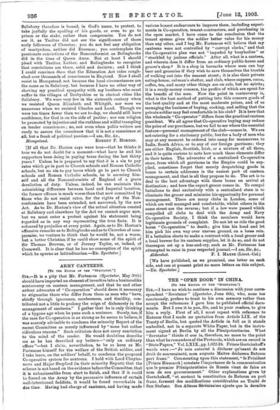ARMY CANTEENS.
[To THE EDITOR OF TEE "SPECTATOR."] Sra,—It is a pity that Mr. Fortescue (Spectator, May 30th) should have imported an element of invective into a businesslike controversy on canteen management, and that he and other ardent advocates of " Co-operation " should deem it necessary to stigmatise those who differ from them as men who "have, chiefly through ignorance, carelessness, and timidity, con- tributed not a little to prolong the reign of dishonesty in the management of canteens." I gather that he is only thinking of a bygone age when he pens such a sentence. Surely, too, if the case for Co-operation is as strong as he seems to believe, it was scarcely advisable to condemn the minority Report of the recent Committee as merely influenced by " none but rather ridiculous reasons." Such criticism does not carry conviction to the mind of the reader. He would doubtless describe me as he has described my betters—" only an ordinary officer "—but I claim, nevertheless, to be as keen as Mr. Fortescue himself for the welfare of the British soldier, and I take leave, on the soldiers' behalf, to condemn the proposed Co-operative system for canteens. I hold with Lord Cheyles- more and Major Stopford (in their minority Report) that the scheme is not based on the evidence before the Committee, that it is unbusinesslike from start to finish, and that if it could be forced on the Army by the persuasive influence of certain well-intentioned faddists, it would be found unworkable in due time. Having bad charge of canteens, and baying made
various honest endeavours to improve them, including experi. ments in Co-operation, tenant-contractors, and purchasing in the open market, I have come to the conclusion that the tenant system gives the soldier better value for his money than any other, and I beg Mr. Fortescue will believe that my canteens were not controlled by " corrupt clerks," and that the Co-operative plan was not " impeded by busybodies" or " shackled by jealous officials." After all, what is a canteen, and wherein does it differ from an ordinary public-house and grocer's shop ? It is a shop in barracks where men can buy beer and groceries if they wish to save themselves the trouble of walking out into the nearest street ; it is also their private eating-house, cabman's shelter, and club, where suppers, cocoa, coffee, tea, and many other things are on sale, but no spirits; it is a ready-money concern, the profits of which are spent for the benefit of the men. Now the point in controversy is, what is the best method of putting into this concern goods of the best quality and at the most moderate prices, and of so managing the business of buying, cooking, and selling that the private soldier may feel comfortable in his club ? It is here that the wholesale " Co-operator " differs from the practical canteen president. We all agree that Co-operative buying may reduce the price of our purchases, but we fail to see where the essential feature—personal management of the club—comes in. We are not catering for a stationary public, but for a body of men who may at any moment be ordered into camp for manoeuvres, to India, South Africa, or to any of our foreign garrisons ; they are either English, Scottish, Irish, or a mixture of all three, and it is quite curious to note how much these elements differ in their tastes. The advocates of a centralised Co-operative store, from which all garrisons in the Empire could be sup. plied, sometimes forget that merely despatching goods in boxes to certain addresses is the easiest part of canteen management, and that is all they propose to do. The art is to deal to the best advantage with these boxes on arrival at destination; and here the expert grocer comes in. To compel battalions to deal exclusively with a centralised store is to eliminate the grocer and minimise his opportunity for personal management. There are many clubs in London, some of which are well managed and comfortable, whilst others in the same street are the reverse; but if a law were passed which compelled all clubs to deal with the Army and Navy Co-operative Society, I think the members would have legitimate grounds of complaint. Do not let us ride the good horse " Co-operation" to death; give him his head and let him pick his own way over uneven ground, on a loose rein. If a battalion elects to make a contract with a local grocer and a local brewer for its canteen supplies, let it do so, and do not thereupon set up a hue-and-cry, such as Mr. Fortescue has attempted to raise in your respected journal.—I am, Sir, &c.,
[We have published, as we promised, one letter on each side, and can at present print no more letters on this subject. —En. Spectator.]










































 Previous page
Previous page